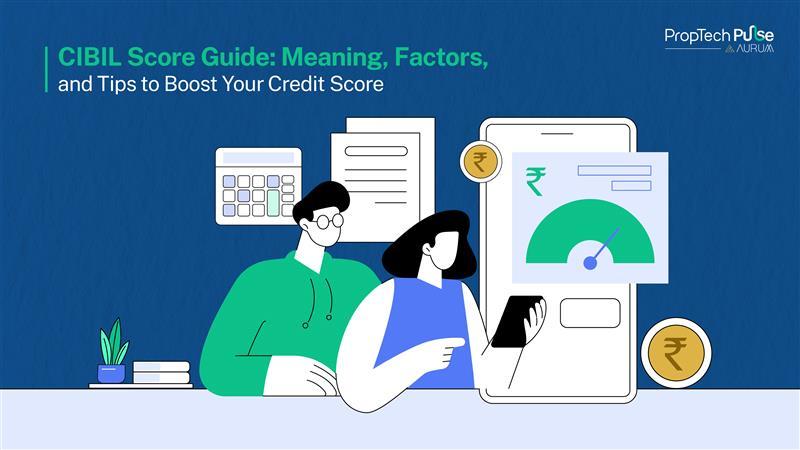Real Estate Efficiency

CIBIL Score Guide: Meaning, Factors, and Tips to Boost Your Credit Score
Planning to take a home loan? Or thinking about applying for your first credit card? Well, then you must consider checking your CIBIL score before entering the credit market. This valuable three-digit number plays a key role in determining whether your application will be selected or rejected by the lender.
Curious to know more about CIBIL score, its meaning, importance, determining factors, and strategies for improvement? This detailed blog will help you understand the CIBIL score in-depth and guide you in improving it for hassle-free loan sanctioning. So, let’s start with it:
What is a CIBIL Score?
A CIBIL score is a three-digit number ranging from 300 to 900 that shows your creditworthiness to lenders. The higher your CIBIL score, the more likely you are to secure a loan. According to reports, nearly 80% of sanctioned loans belong to individuals with a score above 750.
This score is derived based on your past lending activities, including loans, credit card usage, repayment habits, and outstanding credits.
Additionally, a CIBIL score is available for individuals who have had an existing loan or credit card within the last 36 months, as reported to CIBIL. Every person is allowed to get a Free CIBIL Score and Report once per calendar year.
Below is a table defining the different CIBIL score ranges and their significance.
| CIBIL Score Range | Rating | Meaning |
|---|---|---|
| NA/NH | No History | For individuals with no credit records. Lenders may require additional documents. |
| 300 – 549 | Poor | High-risk. Loan/credit card approvals are difficult. High interest rates, if approved. |
| 550 - 649 | Fair | Medium risk. Loans at higher rates and stricter terms. |
| 650 - 749 | Good | Reliable. Access to most loans/credit at fair terms. |
| 750 – 799 | Very Good | Quick approvals. Low rates. Best loan terms. |
| 800 – 900 | Excellent | Top loan products. Lowest interest. Premium offers. |
Why is CIBIL Score Important?
Most Indian banks check your credit score to assess your ability to repay loans. Where a good score can make you a top loan applicant, a poor rating can make it difficult for you to find a lender. The pointers below will help you understand the significance of the CIBIL score:
Loan approvals: The CIBIL score is one of the first factors considered by banks when offering a loan. A higher credit score indicates a positive financial history, thereby increasing your chances of getting approved by the lender.
Lower interest rates: A good credit score gives you a chance to negotiate with your bank for lower interest rates. If you have a score of 800 or above, you can get home loans at up to 0.5%-1% lower than the regular rate. For instance, a loan of ₹50 lakhs for 20 years at 8.5% instead of 9% could save you nearly ₹5 lakh in interest.
Flexible tenures: Besides interest rates, your credit score can help you enjoy flexible repayment schedules. It allows you to choose an EMI that fits your income and financial interests. Thus, making lending more convenient and hassle-free.
Fast processing & less documentation: Your CIBIL score is your pass to easy entry to lenders. Typically, an impressive score results in fewer checks, less paperwork, and faster processing. Lenders will consider you a low-risk applicant and give you hassle-free sanctions.
Check your score instantly with our CIBIL Score Checker Tool on our Pulse website or the KuberX app for free.
Who generates your credit score?
You cannot manually generate your CIBIL score. It is calculated by special organizations called credit information companies or credit bureaus. The Reserve Bank of India licenses these credit bureaus, and the Credit Information Companies (Regulation) Act, 2005, regulates them.
In India, the main credit bureaus are:
- TransUnion CIBIL - India’s first and largest credit information company
- Experian
- Equifax
- CRIF High Mark
The primary functions of Credit Bureaus are:
- Collect and maintain credit information of individuals and business entities.
- Receive monthly reports from banks, NBFCs, and financial organizations related to loans and credit cards.
The data pooled by the bureau helps generate:
- CIBIL Score (for individuals, 300–900 scale).
- CIBIL Rank (for companies, 1–10 scale).
- Credit Reports (known as CIR for individuals and CCR for companies).
4 Main Factors that Affect your CIBIL Score
The CIBIL score is generated using the following four primary data points:
- Credit history: It constitutes the repayment track record of loans and credit cards collected from banks/NBFCs. Defaults and delayed payments can have a negative impact.
- Credit mix: This refers to a balanced portfolio of secured and unsecured debts.
- Credit enquiries: It indicates the total number of enquiries you have made for loans or credit cards.
- Credit utilization: This reflects the portion of the total credit limit you have already consumed. Keeping this ratio below 30% is generally recommended by experts.
Typically, it takes around 3-4 months of active credit activities for the bureau to generate your CIBIL score.
How to Check Your CIBIL Score?
The steps to generate your CIBIL score online are as follows:
- Visit the official CIBIL website or a trusted financial platform, such as PropTech Pulse or KuberX.
- Click on “Get Your Free CIBIL Score” or “Check CIBIL Score.”
- Create a new account or log in to your existing account.
- Enter your details, including name, ID, DOB, and contact number/email. Tap Submit.
- You will receive an OTP on your verified number/email.
- Enter the OTP and view your credit score. You can also download your credit report.
In the event of any error or discrepancy, file a complaint online through the official CIBIL portal.
Who are New-to-Credit (NTC) Borrowers
New-to-credit borrowers are individuals who have never been associated with any formal credit system, including a loan or a credit card. Typically, they are the ones seeking their first-ever credit product.
An NCT borrower will have a credit score marked as NA (-1) or a very low score (101-200) due to the lack of credit records with credit bureaus. This is why they find it challenging to secure a loan from most traditional lenders.
In general, NCT borrowers comprise a significant segment of an untapped market, including people from rural areas, women, and the younger generation. Their credit score begins to build with their first loan, encouraging them to develop healthy credit management practices.
Tips to Improve Your Credit Score
You can improve your credit score by maintaining a good credit history and practicing healthy credit habits. Follow the strategies given below to get a 750+ credit score:
- Be consistent and ensure timely payment of your bills and EMIs.
- Keep your credit utilization ratio low, at 30% or less.
- Avoid applying for new credit.
- Maintain a well-balanced credit mix.
- Diversify your credit portfolio.
- Review your credit report frequently and avoid errors.
Conclusion
The CIBIL score is a prominent deciding factor in loan sanctions by most Indian banks and financial institutions. This three-digit number can help you negotiate with your lender for lower interest rates, flexible tenures, and competitive terms.
A higher credit score makes you stand out in the pool of loan applications received by lenders. We hope this article helped you understand the core of the CIBIL score easily. Plus, if you are a first-time borrower or have a poor CIBIL score, follow the tips mentioned here to improve it quickly. Keep following us for more informative guides.
Unlock the Latest in Real Estate
News, Infographics, Blogs & More! Delivered to your inbox.
“Data that drives action. Insight that inspires action. Technology that empowers action.“
“Data that drives action.
Insight that inspires action.
Technology that empowers action.“









